#carl tats
Explore tagged Tumblr posts
Text

Carl
119 notes
·
View notes
Text

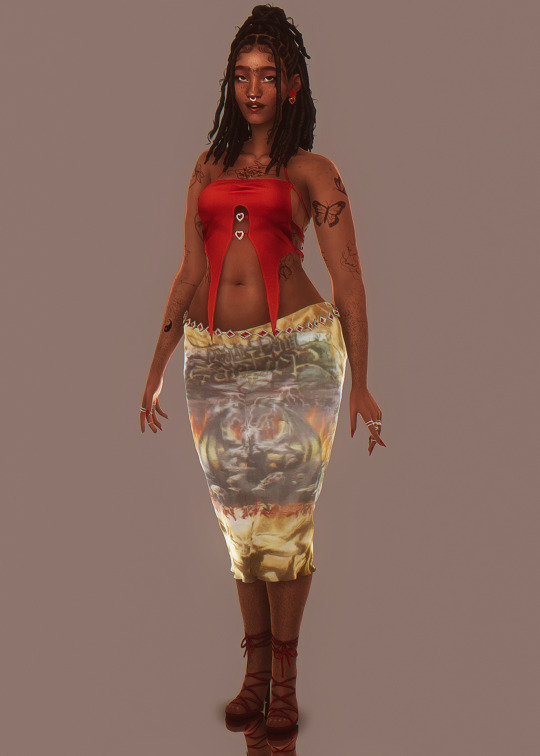


social media influencer and the "roomate" behind the camera
#you just know liberty posts tiktoks around the appt and when her followers see carl in the back they go “omg show us ur fine ass roomate?”#so liberty tries to get her in front of the camera but the most carl gives her is a 3 second clip of her going 😐#and the crowd goes WILDDD#matching tats on FULL display in this one btw ☝️ first time they have been since the og lookbook can u believe#*liberty#*carlotta#*carl and bert#ts4#ts4 edit#ts4 cas#ts4 portrait#the sims 4#sims 4#all edgar sisters + their lovers are officially looking as hot as can be i am satisfied........for now#you can tell the last 3 posts are supposed to go together bc theyre all using the same cas bg! right? RIGHT GUYS??#definitely going back to black after this
219 notes
·
View notes
Text
so, i’m guessing mickey spent a lot of time in the head master’s office when he was young. im pretty sure everyone in the show went to the same school, aside from Liam, so we can assume it’s the same headmaster that Carl got sent to a lot.
now, let’s say franny goes to that school as well. she’s a good kid, so it’s not like she gets in trouble a lot. but she’s been taught by all her family that if someone starts something, you finish it.
so that’s what she does.
she ends up in the office. the head master comes in and tells her he’s calling her mother, and franny’s not worried about that. debbie will defend her tooth and nail. when debbie doesn’t answer the phone (she’s not a bad mother, she’s just at work and turned her phone off) they call the next names down the line, which is ian (debbie says ian is her fave).
so the headmaster is making some comments about the other gallaghers he’s had to deal with. mentioning carl and his ways, and lip and his. he says he’s glad it’s ian coming, because he was the least trouble.
however, both ian and mickey come.
ian knocks on the door.
“come in.” headmaster says.
ian smiles tightly and enters, mickey following behind. they both take inventory of a room they haven’t stepped foot in in a decade, marvelling at how unchanged it is.
the headmaster glances up and honestly? he’ll never forget those knuckle tats. they tortured him for the entire time mickey was in school, because they were strictly against school rules.
mickey smirks when headmaster’s face pales.
“i see you’ve brought company, Mr Gallagher.” he says.
“yeah, sir… hope that’s okay.” he smiles again, never falling out of the pattern of calling this guy ‘sir’.
mickey snorts at him, but takes the seat beside ian, opposite headmaster’s desk. “you’re such a fucking goody-goody.” he mutters, and ian smacks his thigh with a shush.
“i didn’t do anything! he started it!” franny shouts, getting the first word in.
“i’m not entirely surprised to see another gallagher in my office. but it makes even more sense now, Mr Milkovich.” Mickey smiles at him mockingly. “who are you in relation to Franny?” he asks.
“he’s her uncle.”
“right. what is it with you gallaghers and milkoviches intermingling? i had to deal with your sister-“ he points at mickey, “- and your brother-“ he points at ian, “for far too long.”
“good genes.” mickey replies.
“oh, i’m sure.” the principle snarks. “so, we understand the other boy started it. that’s not the problem. the problem is that franny broke his nose.”
mickey barks a laugh, and ian shushes him again even if hes barely containing his own smile.
“i’m glad you’re taking this as seriously as we are.” principle huffs.
“sorry - we’re taking this very seriously. what’s the solution here?” ian asks.
“the boy’s family just want an apology. an easy way out, really.”
franny makes a noise of protest and mickey’s eyebrows shoot up. “a fucking apology? the kid’s clearly an asshole, maybe a little bone breaks from a girl would be good for him.”
“please contain your language, Mr Milkovich. and no, we don’t tolerate violence of any kind here. so franny will have to apologise.” the principle roles his eyes.
“that’s totally fine, excuse my husband.” mickey rolls his eyes and ian’s placating. “franny will apologise.”
although she huffs, she nods as well.
they’re about to get up and leave, taking franny with them, when the principle speaks again.
“if you don’t mind me asking, Mr Milkovich, how long were you in prison for? you see, me and some… fellow colleagues had a little betting pool going.”
Mickey rolls his eyes, and ian laughs.
“you made bets on whether he’d go to prison?”
“not so much on whether he would go, more on how long he’d stay there.” the headmaster corrects, which makes ian laugh.
“you’re such a problem student.” ian tells him, and mickey scoffs.
“like… two years? three maybe? he did escape at one point, not sure how that factors in.” ian tells him, because mickey is busy rolling his eyes.
“i did hear about that. impressive, i must say. i don’t think anyone will win any money on that, most people bet from ten years to life.” the headmaster tells him.
“yeah, well. one, fuck you. two, glad i surpassed your expectations, Principle Twat.” mickey huffs sarcastically, getting up and going.
“i see that nickname is never going.” the principle mutters as the two most insane families he’s had the displeasure of meeting leave the office.
god, he hopes franny won’t be trouble.
89 notes
·
View notes
Text
Every tattoo’s so intoxicating
Janis ‘Imi’ike x fem reader
Warnings: fluff, some coarse language, smutty ending
Little tattoo tour for Janis & her reaction to reader’s first tattoo
Read the main series here

Janis got her first tattoo in college, after a long time of considering, she finally decided to get one on her chest. She’s really proud of that one, and felt way more intensely rooted to her culture with that. Your jaw fell to the floor when you saw the finished result. It was beautiful. Some time after that, she got your birthday tattooed along her left shoulder bone— right before the wedding. Both times, you went along with her for moral support. And as cool as you found tattoos to be, you were too scared of the pain to get even one.
One day, while Janis was out helping Carl and Grace at work, you were tidying up yours and Janis’ room. With Kalia down for a nap, you had some quiet time. You sat down on the edge of the bed, grabbing Janis’ notebook off the nightstand. There was a pencil tucked in between two pages. Curious, you opened the book up to that page. And there it was…an adorable little doodle of the frog Squishmallow she had won for you at the carnival years ago, just…staring at you. Then, you got an idea. You were going to get this tatted, you were finally going to get it done, check that item of your bucket list.
You set the book down and proceeded to finish sweeping the floor. “Mama, will you play with me?” Kalia appeared in the doorway. “I’m bored.” She chuckled.
“Hey, tell you what— how about you and I go for a little drive. Mama wants to get a surprise for mommy.” You picked up the notebook again, gesturing for her to come over. You picked Kalia up and slid her onto your lap, “I…am going to get a tattoo of this lil guy.”
Kalia gasped, “Oooooh.”
“Will you keep it a secret?” You laughed, kissing her cheek.
“Yeah, mama.” The kid agreed, “Mommy will love it.”
“She so will, right?” You hummed, “Alrighty, come on, let’s go get changed and get going.”
“Can we get shave ice please?” Kalia asked excitedly.
You gasped dramatically, “Are we discussing dessert already, my love?”
“Yes?” She giggled as she led you into her room, “I’m gonna wear my shirt with the froggie on it.”
“Nice one.” You smiled, retrieving that said shirt from her chest of drawers, “Okay, jean shorts or jeans?”
“The shorts.” Kalia decided.
“Here you go. Want me to help?”
“It’s okay. I can do it.” She beamed proudly.
“I’ll wait for you right outside, yeah? Want a snack before we hit the road?”
“Pretzels?” She suggested.
“Good choice.” You shut the door and went to the kitchen to grab the snacks for both of you, and a drink each. Couple minutes later, Kalia emerged from her room. “There you are!” You exclaimed cheerily, “Sit down here, baby. I’m gonna do your hair real quick while you snack?”
“Okay, mama.”
————
After making a copy of the doodle, you took the picture and put it in your purse, leaving the original safe and sound. You found a place that accepted walk-ins, and thankfully it didn’t take long to. You were quickly settled in and talked to the artist about what you wanted. As nervous as you were, the man was really understanding and kind. Having Kalia there with you for moral support was also helpful. The girl held onto your hand before the tattoo artist even started. But, it did calm your nerves very quickly. Well, that and you didn’t want to go batshit crazy in front of Kalia and scare her. Either way…you kept it together. Then…it was finally done. There was an adhesive plastic wrap to leave on for about five days, but now that the actual tattooing was done, it wasn’t as bad as you thought it’d be. You paid, tipped and left after expressing your thanks.
You and Kalia stopped somewhere for lunch before driving the rest of the way home. After helping her take a shower, you sat in the backyard while she decided to read. Sipping on your favourite tea, you glanced up at her occasionally to see how she was doing. Roughly a half hour later, she asked if you could colour with her. You agreed, of course. That was always fun. By then, Janis was almost home. And when she was, Kalia immediately giggled and ran up to her. “Mama has a surprise for you~” Janis took her hand, squinting confused, “What is it, baby?”
“Come with meeee.” Kalia pulled Janis into the backyard, stopping next to you. Janis spots the new tattoo on your forearm. “Oh, that is the cutest thing ever.” Janis gasped softly. “Is that my drawing?”
You looked at your wife with a grin, nodding your head. “Yep.”
“I love it.” Janis pecked you on the lips.
“Me too.” Kalia chimed in, you and Janis chuckled.
“Did you have fun today, my love?” Janis asked, sitting down on the chair next to yours. Kalia nodded, “Mhm. Lunch was really yummy too.”
“Ooh, I bet. Mama sent me some pictures.” Janis smooched her on the cheek. The three of you hung out in the backyard until the sunset, then made dinner together. Carl and Grace were a little surprised, but happy to come home to the laughter and aroma of food cooking on the stove. “We’re home~” Grace walked into the kitchen first, “Thanks for making dinner.”
“Of course.” You smiled, “Go wash up, it’ll be ready in a couple minutes.”
————
“How was it?” Janis asked, shutting the bedroom door behind herself. “The tattoo? It hurt, it did.” You admitted with a raised brow, “My tolerance for pain really plummeted after that incident when I had Kalia. But, I got through it. Wasn’t the worst.”
Janis smiled softly, cupping your cheek then stroking it with her thumb. “It looks beautiful, I’ll say. I actually really want to get another one done.”
“Not gonna stop you, because you know I love it.” You snickered cheekily.
“Oh, I do know.” She mirrored your grin, pressing a kiss to your lips. Janis laughed into the kiss right before she kissed you deeply. Which…ignited a little something in you. And god you wished you weren’t this tired. (Not that it really mattered, Janis loved doing all the work sometimes)
“Fuck.” You cursed, biting back a laugh. Janis kept kissing you, and eventually, you were laid on your back with Janis straddling you. “Yes?” She asked innocently.
“Please.” You uttered, for good measure.
The smile doesn’t leave her face as she slid downwards. You feel her breath fanning against you while she pushed your shirt out of the way. “I love you.” She murmured, peppering kisses all over your core which went lower and lower. You started to squirm, she went back up and attacked your neck instead. Janis of course knew exactly where to work over in order to make you tick, it didn’t take long at all for you to feel incredibly aroused. But your sleepiness was also apparent. At the same time, she’d palmed your breast. What finally made your head spin was the feeling of her lips wrapped around your nipple. You gulped, exhaling harshly. “Fuck.” You laughed breathily when you feel her tug on the sensitive flesh. Janis kept at it, going on and on minute after minute of giving your tits the attention. She knew you like the back of her own hand…this always riled you the hell up. Her eagerness time after time always drove you crazy, but it was more so the fact that she was always gentle with you until…well, you didn’t want gentle. Pretty soon, every inch of your exposed skin was marked by her kisses. Each touch of her lips against your skin sent a rush of heat that pooled between your thighs. Janis sat on your core, knees on either side of you hips as she cupped your face in her hands. “You wanna do it?” She asked, like always. Looking at your flushing cheeks and pouted lips, she couldn’t help but grin.
“Yeah.” You told her, voice barely above a whisper as your mouth went dry. You also nodded, so she definitely got it. Janis nodded as well humming in approval as she leaned down to meet your lips, making out with you. Each kiss got deeper and hungrier, with the heavy breathing and the slight struggle to breathe you writhed beneath her. You were getting just a tad impatient. Janis laughed, her breath fanning against your face as she tilted your chin and pulled away from the kiss. Cooing softly, her gaze then fell onto your bicep. Her thumb brushes over the plastic-protected area on your skin, “This is crazy.”
“Really?” You asked sweetly, “I would say crazy is you doing this while knowing exactly what I want.”
“I’m always a little crazy, what do you mean?” Janis smirked, fingers tracing your arm mindlessly. “Is it uncomfortable to lay it like that?”
You squinted at her, this sudden sweetness when she was being smug annoyed you. Obviously. You needed her. “I mean— yeah, but how else do I leave it? Fold my arm and rest it on my chest?”
She snorted, “No, I want to give your boobs some love.”
You laughed, “What? You’re—”
“Hey. You said so yourself. I’m a tit head.”
You rolled your eyes at her playfully. She leaned closer to your face again, palm slowly going from your chin and wrapping around your neck ever so gently. “Keep this up and we’re using the strap.” Her voice was husky and slightly intimidating. Another rush if heat pooled in between your thighs. You whined, “I don’t want the strap.”
“Oh, you don’t?” She teased. “So what do you want?”
“You. Fuck me.” You smiled back as sweetly as you could, she loved it. And she slid back down, settling herself in between your legs, sliding your shorts and underwear off as she moved. You lifted your hips and let her slide those articles of clothing off.
“Glady.” Janis looked at you in anticipation of your taste, “Open up, baby. You don’t need me to tell you what to do…”

🏷️Tag list:
@ashecampos @auliisflower @cheesysoup-arlo @frogs00 @ludoesartandstuff @pda128
💭A/N:
Another bonus chapter for the series. Took me a damn long time but I want to stay consistent regardless. Here it is.
#auli’i cravalho#janis ‘imi’ike#janis ‘imi’ike x fem reader#x reader#female reader#reader insert#mdni#18+ mdni#wlw smut#fluff#queer fiction#fic: euphoria#multi part fic#mean girls 2024#alternative universe#mgmm fics#drabble#ficlet#extra chapter
22 notes
·
View notes
Text
Back in February, I had the innocent idea of rewatching all of season 1 of Big Hero 6: The Series while sick. Good idea, right?
Well, it was spun into one of the most entertaining conversations I’ve had with my friends!
Me: After the last ep I need to go back and rewatch up until Failure Mode
Glob: i might as well have these eps tattooed to my eyelids so i will have even more things to say about these
Me: I never plan on getting tattoos but. An “Unbelievable” tattoo would go hard
Do you see our mistakes? I do!
Enjoy this! (Under cut)
Big Hero 6 Discord presents: Awful Tattoo Ideas!
(Blame @gelatinous-globster for this)
-Full back tat of Tadashi exploding
-Knuckle tats that say HAMADABROS
-NBB chest tat. It should have "Everybody do the noodle” across his face in papyrus font (Alternatively: the words would be across the collarbones)
-Globby sleeve of just busts, headshots, and lines he says
-Face tat that says “everybody do the noodle” (Complete with ketchup and mustard tears!)
-Steamer tramp stamp
-Supersonic Sue/Stu face tat (Glob’s contribution: “you know face paint tigers? like where your face becomes the tiger's face? im thinking it's like that”)
-Obake face tat but it’s just his scar
-”Yummy” tattooed on the other cheekbone with “delightfully fruitful” on the other cheekbone (in the most obnoxious font ever)
-Richardson Mole knee tat
-El Fuego on the other knee
-”Yummy” across your knuckles
-Bluff Dunder thigh tat (in full color, with roses)
-Krei tat on the other thigh (with the tulips he gave Aunt Cass. There should be a buddy guard shooting him, too. It's a whole illustration, same as Bluff's)
-Ned Ludd neck tattoo. Him from the waist up emerging aesthetically from the shoulder and holding out his staff across the throat. Bessie is right over the adam's apple.
-Yama ankle tat, and the toe knuckles (?) on the according foot spell out “YAMA”
-Felony Carl on the opposite ankle of Yama. Toe knuckles say “CARL”
-An upgrade chip tattoo on your neck (this one is actually pretty sick, thanks Kuro)
-Heathcliff chest tat
-Karmi in Beast Mode on the forehead
-Tadashi running into the fire scalp tat (Only for bald people)
-Boss Awesome back tat, where his face is on the back of the head, his body is on the back, and his arms are on the back of the arms. every time you flex, he's doing it too (Also bald person exclusive. Bummer!)
-“It’s Fredzilla time!” On the back of the neck. Every time you get a haircut, the barber/hairdresser has to see it
-Di and Chris calf tats (Di is brandishing a nanoreceptor and Chris has cupcakes)
-Callaghan (specifically in the jail cell) on the small of the back
-Chief Cruz in a tutu. On the jaw. You lift your chin and come face to face with Cruz
-Mr Sparkles’ toupe skull tat (another one reserved for bald people)
-Very tiny ones of the two scientists from the movie who are voiced by Dan and Phil on the sides of your wrists
-Felony Carl with mayoi chest tattoo, shoulder to shoulder
-The arm that doesn’t have the Globby sleeve has the kabuki mask monologue from that random police officer in the movie
-High Voltage fish on the back thighs
-High Voltage humans on each shoulder
-”Yummy” on the inner thigh
-Bolton Gramercy on one of the inner thighs
-Mini-Max with rose on one elbow
-NBB with stickers on the other elbow
-Granville on the inner elbow
-Yum Le'bouche on the other inner elbow (you move your arm and it looks like he’s talking)
Glob: "mr sparkles womb tattoo" is kind of foul even for my standards
Me: A womb tat of Mr. Sparkles face is horrendous
Glob: i was moreso thinking him in a "draw me like one of your french girls" pose but the image of his face just real stretched out is so funny
This went on for 48 minutes.
Thanks to my friends for entertaining me while I was severely ill (I had a common cold, which probably made this entire conversation funnier than it is now)
I hope everyone enjoyed our stupidity, if anyone but said friends have read this far! If anyone would like to draw the poor human that has to endure this, I would love to see it! /j
(Also, there’s an honorary tattoo of 6D on the ear he requested as I was making this post)
#big hero 6#big hero 6 blog#big hero 6 memes#bh6 discord#<- only usual tags I’m using#I am NOT tagging all those characters#friends if anyone wants their tattoo idea credited (why wouldn’t you!) Lmk :3
12 notes
·
View notes
Text
ΑΒΡΑΣΑΞ -- ABRASAX From a Hermetic Viewpoint.
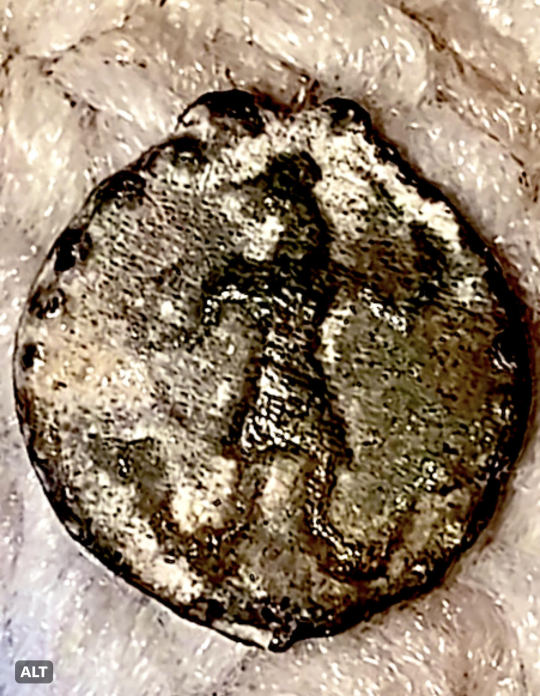
To the Gnostics, Abrasax is the great archon who created the whole world. There is quite a bit of nuance considering how Basilides Gnosticism views this deity. Nuance that I am not qualified to go over at the moment. Carl Jung refers to Abrasax as a truly terrible entity that encompasses all evil and all good, in his Red Book. I've seen negative reactions from people on Discord to this entity, but also some positive reactions.
But to the Hermeticist…who and what is this weird rooster head, snake-legged deity that is found all throughout the Greek Magical Papyri (PGM)? Let’s find out?
In the Discourse of the Ogdoad and Ennead (D89) we are given strings of vowels and nomina Barbara for the Hermetic student, namely Tat as he is being taught by Hermes. To Christian H. Bull in his The Tradition of Hermes Trismégistōs, the string of Greek vowels and nomina Barbara/voces magicae is the totality of the Kosmos. Tat asks to receive the imprint of fullness by ways of hymns of praise to God. Bull seems to agree with Alberto Camplani that the “imprint of Fullness (Pleorma)” is coded within these string of vowels and voces magicae.
From personal experiences — I have to agree with this, but I had to fuck around and find out for myself as I read this book many months ago when vowels and voces magicae were not big in my praxis. Anyways, here is the full hymn:
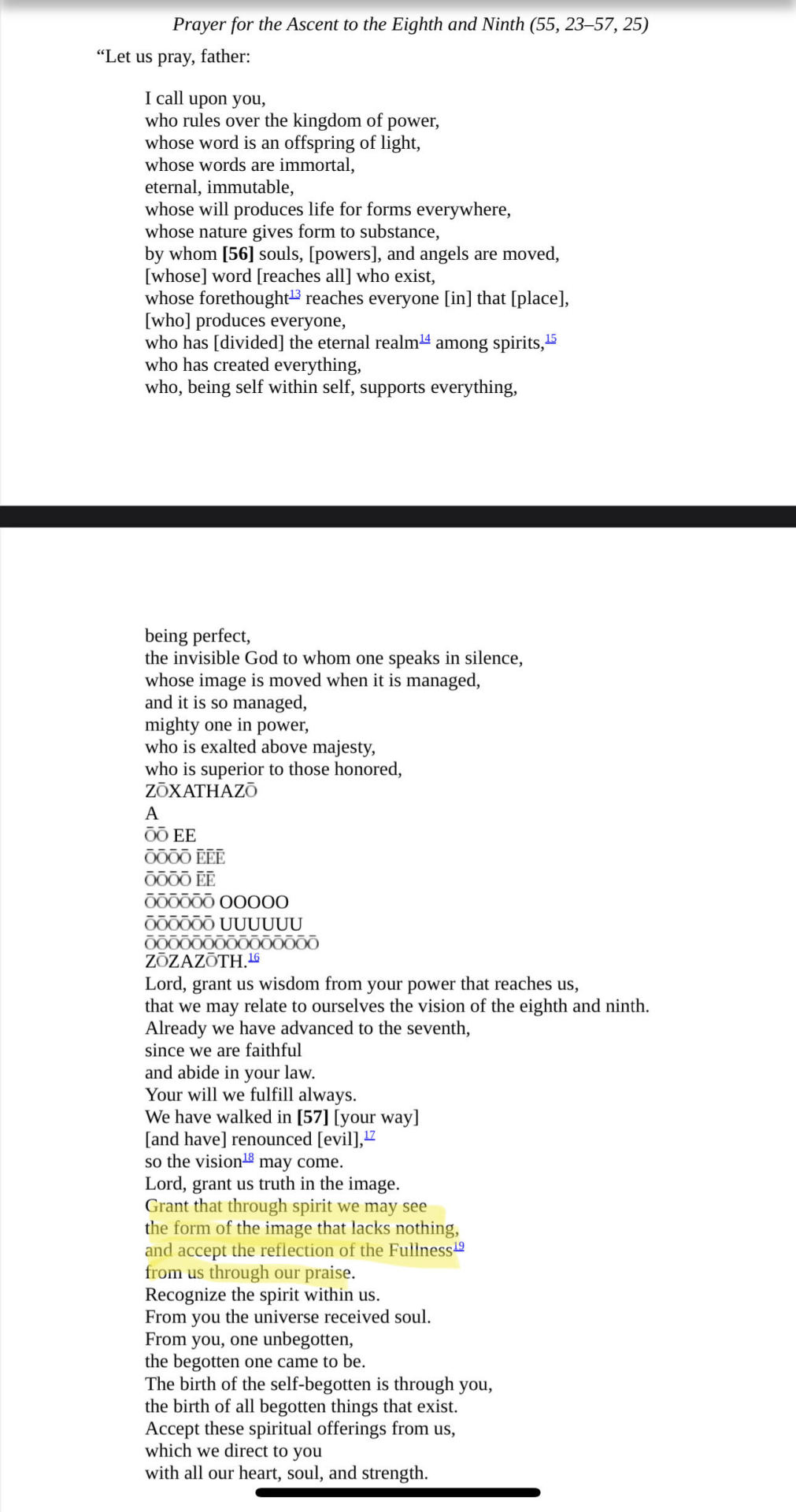
Great! So how does this tie into ΑΒΡΑΣΑΞ and what is this names value to a Hermeticist? For starters — This name, has a numerical value of 365, according to isopsephy. 365, as the majority of you know, is the totality of days our Earth revolves around the Sun. In PGM VIII. 1-63, specifically in lines 45-50… we see a love spell invoking Hermes to which we are given the name of ABRASAX equaling 365 explicitly, and quite possibly a voces magicae for Hermes.
The Sun's importance in Hermeticism is ever-present. Most explicit in my opinion is SH 2a from M. David Litwa’s Hermetica II:
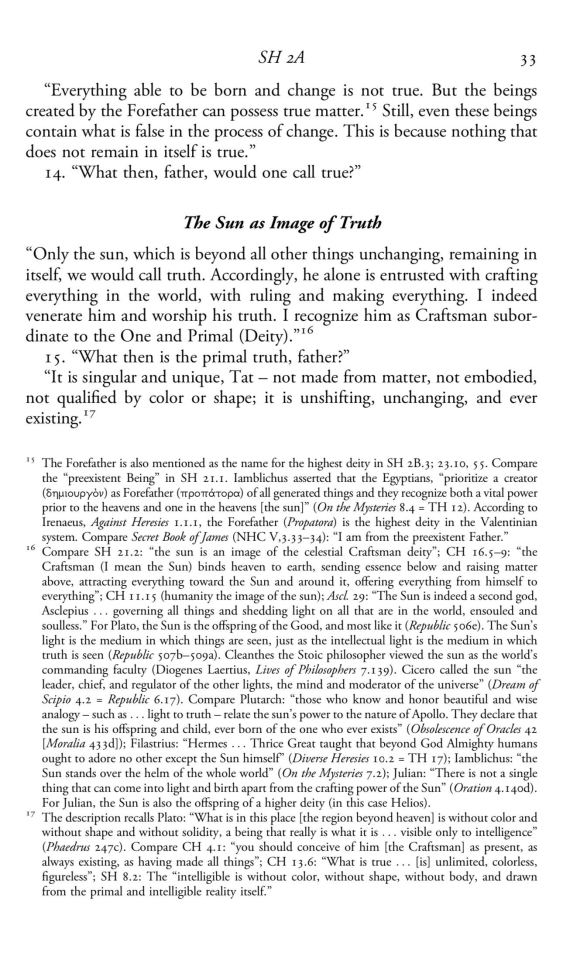
Also important to note: Thoth. Many believe Thoth is just the god of the Moon, yet Thoth has a Solar form: the Baboon. Baboons and their screeches are believed to be connected to the language of the gods. This is confirmed in the Demotic Book of Thoth. Where a scribe of Thoth’s Scribal College: The House of Life [𓉑], says this about the great teacher, Thoth: "The signs revealed their form. He called to them and they answered to him. He knew the form of speech of the baboons and the ibises." Thoth is also believed to be the creator of not just words and language but also vowels (Philebus 18b-c). For clarity's sake, Thoth is an extremely important figure in Hermeticism. Our teachings are based upon a syncretic god: Hermes & Thoth — Hermēs Trismégistōs.

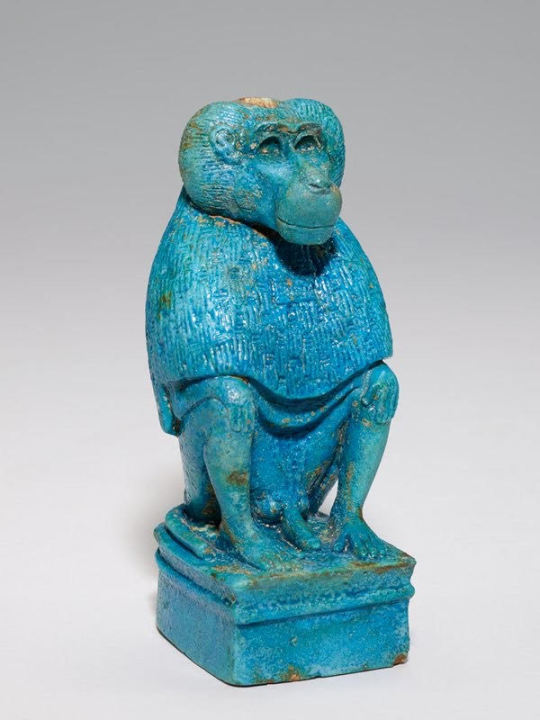
More evidence for the importance of ΑΒΡΑΣΑΞ is found in PGM XIII.1-343 — the famed Heptagram Rite, which we can perform more clearly and neatly here. This is a ritual that invokes Aiōn. Aiōn is believed to be the power of the Unknowable, Ineffable Godhead in Corpus Hermeticum XI. In lines 80-89 of PGM XIII, we are given voces magicae to Aiōn in 7 different languages as seen below.
Birdglyphic: ΑΡΑΙ Hieroglyphic: ΛΑΙΛΑΜ Hebraic: ΑΝΟΧ ΒΙΑΘΙΑΡΒΑΘ ΒΕΡΒΙΡ ΕΧΙΛΑΤΟΥΡ ΒΟΥΦΡΟΥΜΤΡΟΜ Egyptian: ΑΛΔΑΒΑΕΙΜ Finally, in Baboonic: ΑΒΡΑΣΑΞ
(The voces magicae for Aiōn is continued in 'Falconic' and lastly hieratic languages). Thus, we can see a clear link to baboons and Thoth, the name Abrasax to the baboons, and their "language." We see a connection between Aiōn and Abrasax, and we also saw above in PGM VIII that it could also be used as a voces magicae to Hermes!
But let’s look at the imagery as well. A rooster head with snake legs. The legs, to me, are Chthonic of course, and curl up to shape an Ω, the seventh sphere, Saturn. The connection to Omega is something Christian H. Bill points out. The rooster is also a Solar animal. So to me, we have a beautiful image representing the totality of All Things from the Sun whose an image of Truth, directly subordinate to the One Primal Deity (SH 2a), down to the Du’at/Underworld. Both Hermes and Thoth are connected to the Underworld as well as the Sun. Hermes' planet, Mercury is the closest planet to the Sun. Hermes is also famously known as a psychopomp, a traveler and mediator between Hades and Mount Olympus, Death and Life. Thoth, with His solar connections stated above, is also a key member of the Ancient Egyptian Underworld. In the Ani Papyrus, we see Thoth as the recorder/scribe that lists every heart that is weighed up against the Divine Feather of Truth -- Ma'at.

Thus what we have here, from a Hermetic standpoint, is that Abrasax is not a malevolent archon or a demon as denoted by the early Catholic Church, but rather a beautiful deity that is worthy of reverence whose name equals our revolution around the Sun, the Image of God. Abrasax — a name that is connected to both Hermes and Thoth, for reasons stated above. A name that also has a connection to Aiōn, an extremely important power/god in Corpus Hermeticum XI.
That is my interpretation, from a Hermetic standpoint. There are many interpretations of this elusive yet captivating deity. Abrasax can be a voces magicae for Hermes, or for Aiōn, it can be what I said, or you can take the Gnostic approach, or Jung, or Catholic approach to Abrasax. Regardless of what you do with the information, I shall continue to raise my voice in jubilation and cry out:
ΧΑΙΡΕ ΑΒΡΑΣΑΞ !

#hermeticism#gnosticism#demon#aion#greek magical papyri#corpus hermeticum#Ogdoad#ennead#nag hammadi library#Abrasax#archon#hermetica#magic#ritual#spells#hermes trismegistus#hermes#thoth#greco egyptian#egyptian#Greek#mythology#underworld#sun
41 notes
·
View notes
Text
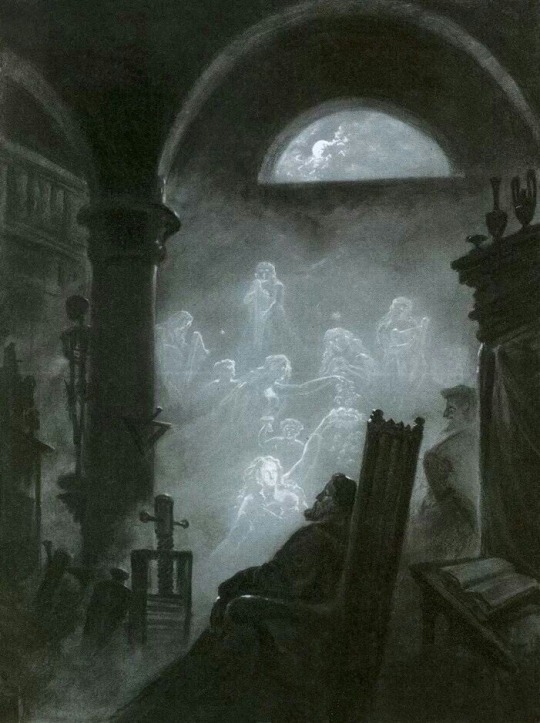
Faust’s Dream by Carl Gustav Carus (German, 1789–1869)
* “That’s the existential problem,“ Fat said, "based on the concept that We are what we do, rather than, We are what we think. It finds its first expression in Goethe’s Faust, Part One, where Faust says, ‘Im Anfang war das Wort’. He’s quoting the opening of the Fourth Gospel; 'In the beginning was the Word.’ Faust says, 'Nein. Im Anfang war die Tat.’ In the beginning was the Deed. From this, all existentialism comes.”
― Philip K. Dick, VALIS
[alive on all channels]
13 notes
·
View notes
Text
Return to Gravity Falls

Jason Ritter
Kristen Schaal
Alex Hirsch
J.K. Simmons
Linda Cardellini
Dee Bradley Baker
Carl Faruolo
Niki Yang
Justin Rupple
Jackie Buscarino
Thurop Van Orman
Jillian Bell
Michael Rianda
Jessica DiCicco
John DiMaggio
Jennifer Coolidge
Stephen Root
Kari Wahlgren
Nathan Fillion
Kevin Michael Richardson
Keith Ferguson
Gregg Turkington
Will Forte
Matt Chapman
Alfred Molina
Cast:
Agent Trigger: BRAD ABRELL
Waddles: DEE BRADLEY BAKER
Tad Strange: CECIL BALDWIN
Filbrick Pines: JONATHAN BANKS
Sev’ral Timez: LANCE BASS
Blendin Blandin: HARRY BELDEN
Melody: JILLIAN BELL
Greg Valentino: KURT BRAUNOHLER
Pacifica Northwest: JACKIE BUSCARINO
Sergei: FRANK CALIENDO
Shermie Pines: BOBBY CANNAVALE
Wendy Corduroy: LINDA CARDELLINI
Abuelita Dolores Ramirez, Marius von Fundshauser, Mermando, Sev’ral Timez, & French Lilliputians: MATT CHAPMAN
Craz: GREG CIPES
Lazy Susan Wentworth: JENNIFER COOLIDGE
Pirate Lilliputtian: JIM CUMMINGS
Mrs. Gleeful, Clerk, Gourney, & Carla McCorkle: GREY DeLISLE
Tambry: JESSICA DiCICCO
Manly Dan Corduroy: JOHN DiMAGGIO
Grenda Grendinator: CARL FARUOLO
Deputy Edwin Durland & Testosteraur: KEITH FERGUSON
Preston Northwest: NATHAN FILLION
Mayor Tyler Cutebiker: WILL FORTE
Stanley Pines, Soos Ramirez, Fiddleford McGucket, Nate, the Gnomes, Sev’ral Timez, Wendy’s Brothers, Sir Lord Quentin Trembley III, Biker, Farmer Sprott, Mayor Beffufflefumpter, & Bill Cipher: ALEX HIRSCH
Pacifica’s Friend 2: ARIEL HIRSCH
Wax Larry King: LARRY KING
Bus Driver: KYLE MACLACHLAN
Celestabellebethabelle: SAM MARIN
Multi-Bear: ALFRED MOLINA
Janice Valentino: KIMBERLY MOONEY
Agent Powers: NICK OFFERMAN
Knight Liliputtian: JOHN O’HURLEY
Franz: PATTON OSWALT
Mrs. Pines: ANNIE POTTS
Mr. Pines: CHRIS PRATT
Thompson, Lee, & Mr. Poolcheck: MICHAEL RIANDA
Sheriff Daryl Blubs, Ghost Eyes, Chutzpar, Leaderar, & Tats: KEVIN MICHAEL RICHARDSON
Dipper Pines: JASON RITTER
Xyler: JOHN ROBERTS
Bud Gleeful: STEPHEN ROOT
Robbie Valentino: JUSTIN RUPPLE
Mabel Pines: KRISTEN SCHAAL
Blind Ivan: PETER SERAFINOWICZ
Stanford Pines: J.K. SIMMONS
Pituitor & Glurk: FRED TATASCIORE
Bodacious T: GREGG TURKINGTON
Gideon Gleeful: THUROP VAN ORMAN
Shandra Jimenez, Priscilla Northwest, Pacifica’s Friend 1, Polly, & Caryn Pines: KARI WAHLGREN
Gompers: FRANK WELKER
Time Baby: DAVE WITTENBERG
Candy Chiu: NIKI YANG
#gravity falls#alex hirsch#dipper pines#mabel pines#stanley pines#stanford pines#soos ramirez#wendy corduroy#fiddleford mcgucket#waddles the pig#grenda grendinator#candy chiu#robbie valentino#pacifica northwest#gideon gleeful#melody#dipcifica#melsoos#robbry#blurland
12 notes
·
View notes
Text
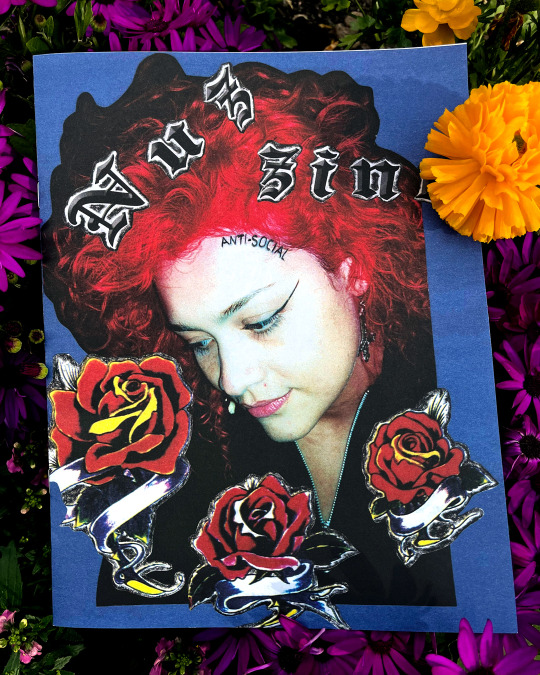
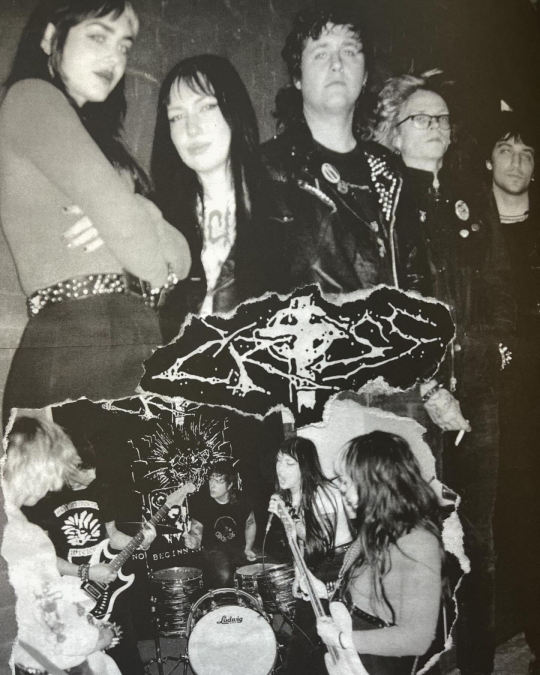
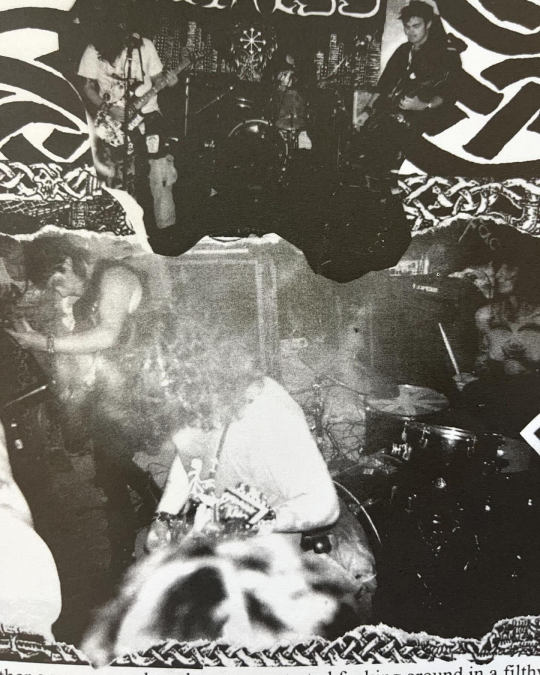
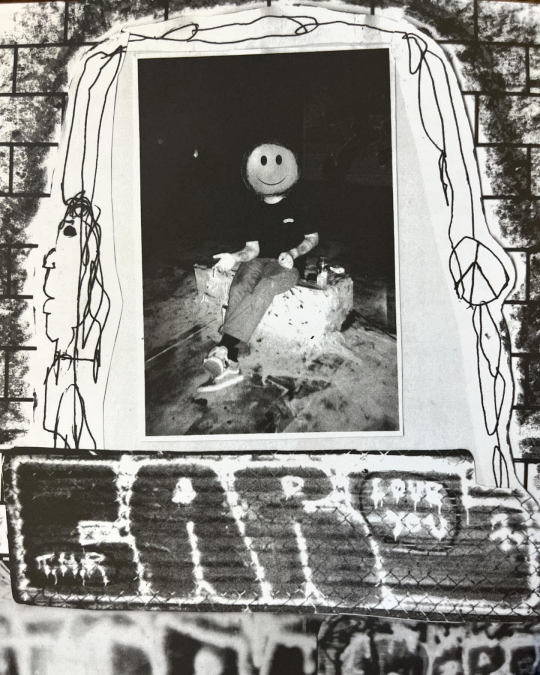
🌟 new!!! “Nuz-Zine” is out this weekend for the NY art book fair‼️ A step beyond with one foot planted in the past. FEATURING: Cancer Carl, No Fucker, Witness, Cross, NY and global! And a Cancer Carl sticker ;)
Pick up Nuzzine at the Papertown & Nuzzzzzy table. We’ll also have back issues of Tattoo Punk Fanzine, the new Tombly collection, Tat Punk long-sleeves, a few more NO WAR Cancer Carl T shirts and lots of other zine items.
And on Sunday, May 12 come to the Nuzzine party! More info soon!
Thank you
free Palestine
8 notes
·
View notes
Text

Superstar
Das Fest war schön gewesen.
Wir hatten geschwitzt und standen neben der Bühne, um noch Autogramme zu geben.
Viele der Menschen, die vorher im Publikum gesessen hatten, kamen auf uns zu, um uns anerkennend auf die Schulter zu klopfen. Ein älterer Herr im feinen Zwirn drückte mir die Hand und schwärmte in breitem Sächsisch: „Aaaach! So ’ne scheene Sendung!“
Als sich das Festzelt fast geleert hatte, blieb noch eine Frau, etwa Mitte dreißig übrig, die einen Teenager hinter sich herzottelte.
Ich erkannte das Mädchen sofort: Sie war mir bereits in der Tanzgruppe aufgefallen, die vor unserem Programm auf der Bühne herumhopste. Laut hatte die Sechzehnjährige alle Pop-Songs mitgesungen und wahrscheinlich deshalb die gesamte Schrittfolge vergessen. Alle kamen durcheinander. Die Betreuerin stand an der Seite, versuchte lautstark die vermasselte Choreographie zu retten um schließlich resigniert dem Treiben zuzusehen.
Nun bat die Mutter des Mädchens um ein Autogramm von uns. Dabei schob sie ihre Tochter mit sanftem Nachdruck vor und bat: „Können sie Für Kira draufschreiben?“
Ich tat ihr den Gefallen und dann fragte sie noch, wie es denn dazu gekommen sei, dass wir Sänger wurden und „sooo berühmt“.
Vor allem aber interessierte sie sich brennend dafür, wie man ins Fernsehen kommt.
„Aha!“, staunte ich. „Sie wollen ins Fernsehen!?“
„Nicht ich. Aber de‘ Kira. Sie ist so musikalisch! Und auch tänzerisch begabt. Sie hat einfach den Rhythmus. Sie muss ins Showgeschäft!“
Ich sah Kira an und fand, dass sie wirklich ein nettes Dingelchen war: Eine Mischung aus Britney Spears und Helene Fischer, allerdings mit Kleidergröße 42 bei 1,55 m Körpergröße.
Kira grinste unsicher und piepste: „Ich habe schon als Fünfjährige bei der Mini-Playback-Show in Großenhain teilgenommen.“
„Und den 3. Platz belegt, mein Spatz!“, ergänzte die Mutter liebevoll lächelnd.
Ich lächelte zurück. Wie sollte ich ihnen den Weg zum großen Erfolg beschreiben?
„Sie ham‘ doch auch bestimmt auch mal ganz klein angefangen?“ Die Mutter blickte mich fragend an.
Ich sollte ihr also sagen, wie’s geht! Wollte ich ihr wirklich erzählen, dass ich in Kiras Alter bereits an jedem Wochenende in einer Profi-Band zum Tanz gesungen hatte?
Erwartungsvoll blickten mich beide an und ich setzte mich zu ihnen auf die Bank.
„Zuerst muss Kira wirklich den festen Wunsch haben, Künstlerin zu werden. Möchtest du tatsächlich auf die Bühne? Welches Instrument spielst du denn?“, fragte ich das Moppelchen.
„Computer!“ antwortete Kira wie aus der Pistole geschossen. Sie war ein fixes Mädel.
Ich atmete tief durch: „Dann sollten sie vielleicht zuerst eine Gitarre kaufen oder ein Keyboard. Es gibt doch gewiss eine Musikschule hier, und wenn da keine freien Plätze mehr sind, nehmen sie sich einen Privatlehrer. Zwei Wochenstunden genügen für den Anfang.“
Die Mutter nickte eifrig und drückte Kiras Hand. Das Mädchen rutschte unruhig hin und her und fühlte sich in dem engen, elastischen Dress, das jede Speckfalte betonte, offensichtlich nicht wohl.
„Nach einem Jahr, wenn Kira fleißig geübt hat, rufen sie in einer Musikhochschule an und erkundigen sich nach den Terminen für eine Eignungsprüfungen.“
„Und dann kann’s losgehen! Dann wird sie entdeckt!“ Kiras Mutter war begeistert. „Welche Schule empfehlen sie denn?“
„Ich habe in Dresden an der Carl-Maria-von-Weber studiert. Das sind etwa 80 km von hier entfernt. Noch vor dem Abitur kann ihre Tochter dort vorsingen. Und wenn sie diese Eignungsprüfung bestanden hat, bekommen sie Bescheid.“
„Und dann kann’s losgehen?!!“
„Dann bekommen sie einen Termin für die Aufnahmeprüfung! Darauf sollte sich Kira besonders gut vorbereiten. Da wird nicht nur gesungen und getanzt. Da werden auch Fragen zur Musiktheorie und Musikgeschichte gestellt. Das Allgemeinwissen wird geprüft. Und Kira wird sicher nicht die Einzige sein, die sich bewirbt.“
Ich erinnerte mich daran, dass es damals bei meinem Vorsingen nur drei von über hundert Bewerbern geschafft hatten.
Kira nestelte abwesend an ihren überdimensionalen Ohrringen, während die Mutter an meinen Lippen hing: „Und dann kann’s losgehen?! Wie lange dauert denn so ein Studium?“
„Acht Semester!“ antwortet ich. „Wieviel Silvester?“ fragte Kira.
Ich kürzte ab: „Du studierst vier Jahre lang Gesang, bekommst Schauspielunterricht, eine Tanzausbildung, Klavier- und Gitarrenunterricht, lernst Noten und Englisch oder Italienisch. Dann gibt es noch die Fächer Psychologie und Pädagogik, Musikgeschichte, Gehörbildung, Tonsatz und Chorgesang, mehr als 15 Fächer.“
Kiras Augen blinkerten ungläubig.
„Alle halben Jahre sind Prüfungen und da sind auch schon mal Agenten von Musicalbühnen und Theatern dabei um sich über den Nachwuchs zu informieren. Nach vier Jahren schreibst du dann eine Diplomarbeit und machst dein Staatsexamen. Und wenn das bestanden ist, bekommst du ein Zeugnis, in dem drinsteht, das du die Berufsbezeichnung Sängerin führen darfst. Dann musst du nur noch zur richtigen Zeit am richtigen Ort sein - und dazu brauchst du dann richtig viel Glück!“
„Und dann kann’s losgehen!“ sagte die Mutter sehr energisch. „Wie kommt man denn nun ins Fernsehen?“
„Da gibt es eigentlich nur zwei Möglichkeiten: Entweder sie kennen den Unterhaltungschef persönlich sehr gut, oder sie müssen es machen wie all die anderen auch. Sie brauchen eine CD!“
Kira sagte gähnend: „Auf so eine CD singen wollte ich doch sowieso. Und da muss man studieren für?“
„Du musst nicht. Aber es ist besser, das Handwerk zu lernen, das man ausüben will. Oder möchtest Du nur mal so kurz berühmt sein, wie einige Voreilige, über die alle nur lächeln und über die nach paar Wochen keiner mehr spricht? Und wenn man einen Produzenten oder noch besser, eine Plattenfirma findet, muss man die CD auch nicht selbst finanzieren.“
„Wieso selbst finanzieren? Macht das nicht das Fernsehen?“ Die Mutter wurde unruhig.
„So einfach ist das nicht. Fast jeder Künstler, der im Fernsehen zu sehen ist, hat eine Plattenfirma hinter sich. Das Fernsehen hat mit den CD- Produktionen nichts zu tun.“
„Was kostet denn das so? Sagen wir mal.... eine CD mit 20 Liedern?“ fragte die Mutter entschlossen.
„Vielleicht wäre ein Single mit drei Liedern für den Anfang ausreichend. Denn unter einem Tausender pro Titel kommt man nicht weg, wenn es vernünftig werden soll. Ein Komponist und ein Textdichter muss gesucht werden und natürlich ein Musik-Studio. Wichtig ist auch das CD-Cover. Sie brauchen ein professionelles Fotostudio und einen Visagisten. Man sollte auch an ein Kostüm denken. Einfach in eine Boutique gehen und sich was aufschwatzen lassen, ist der nicht besonders klug. Denn es gibt Gesetze auf der Bühne und besonders beim Fernsehen, die wirklich nur ein richtiger Kostümbildner kennt.“
Ich streichelte der unterdessen schlafenden Kira über’s Haar und stellte mir vor, wie viel Arbeit nötig wäre, dieses junge Talent in eine ansehnliche Bühnenerscheinung zu verwandeln.
„Schließlich werden die fertigen CD’s an alle Rundfunk- und Fernsehsender verschickt. Und dort hört sie mit viel Glück ein Redakteur. Aber wenn Kira öfter mal Auftritte in Clubs oder bei Stadtfesten hat, bekommt sie ein gutes Gefühl für die Bühne und vor allem fürs Publikum und dann kann es auch passieren, dass sie tatsächlich entdeckt wird.“
„Und dann kann’s losgehen...“ Sagte die Mutter nun schon etwas verkrampft.
Und weil ich wirklich helfen wollte riet ich, es erst mal in einer Band zu versuchen oder mit Halbplaybacks zu singen.
Aber fürsorglich wie ich nun mal bin, sagte ich auch, dass es besser wäre, ein eigenes Mikrofon anzuschaffen, vielleicht einen Minidisk-Player und ein Hall-Gerät: „Und wenn ein Veranstalter kommt, dem Kiras Darbietung gefällt, braucht sie auch Fotos von Kira oder Prospekte mit Informationen. Die sind sehr praktisch, wenn sie Werbung für ihre Tochter machen wollen. Einen Manager müssten sie wieder extra bezahlen.“
Kiras Mutter hatte sich erhoben. Ihre Augen funkelten zornig. In der einen Hand hielt sie unser zerknülltes Autogrammfoto. Mit der anderen Hand zog sie ihre schlaftrunkene Tochter, die den tollsten Paßgang der Welt beherrschte, hinter sich her.
Mit einer Lautstärke, die ich ihr nie zugetraut hätte, rief sie: „Sie wollen uns wohl verarschen!?“
Und während sie rasch mit der heulenden Kira das Festzelt verließ, schimpfte sie noch: „Diese Tussi hat doch keine Ahnung! Papa und Oma haben gleich gesagt, daß du bei ‚Deutschland sucht den Superstar’ vorsingen sollst.“
3 notes
·
View notes
Text
Intro Post
Thanks to @bawlbrayker 's intro post from @callivich 's awesome way to introduce ourselves to others/newbies in the Gallavich fandom!
Name: (can be a nickname) Lem
Age: Early 30s, maturity level is below
What made you fall in love with Gallavich? II love how they kept coming back to one another even when they doubted why someone would come back for them.
How long have you been a fan? since 2021? Maybe 2020 but 2021 for sure.
Favourite Gallavich moment/scene? Hell there are so many. Gallavich is what got me to watch Shameless, so I'm going to say the florist scene, Mickey and Terry facing off with guns after Ian and Mickey are engaged ("I definitely love one"). The first kiss.
Favourite Shameless character apart from Ian and Mickey? Hmm this one is hard, a mix between Carl and Fiona. Carl because he reminds me of my little brother, Fiona because she reminds me of me.
Do you write or draw or make edits? I write! I do different crafts for @gallacrafts every month, but drawing isn't my best talent.
Favourite type of Gallavich fics? I love em all. Love Aus, love soulmate fics, love alternate first meetings, soft and comfort are my favorites.
Favourite Gallavich quote? "What you and I have, makes me free" Got it tatted.
Anything else you’d like to share about yourself? I have a certain number of WIPS at any given time, but I am going to finish the bastards.
#gallavich fandom#welcome to the club#we have jackets#stickers#monthly meetings in various subgroups#join gallacrafts#galladrabbles
11 notes
·
View notes
Note
I didnt know that fic yet! I will look at it asap
Mickey being fostered by Kev and V is a awesome way to get him away from Terry
ofcourse he goes over to Ian often then theyre basically all sharing households and their toaster is probably still stolen by Carl
Ethel as his foster sister maybe please its so sweet I think even if shes a bit off sometimes Mickeyd like her and become a little protective over her
Body mods as comfort! and way to alter his body when other ways are too hard to handle money-wise atm let him find some confidence that way yes thank you!
im just obsessed with the idea of early seasons gallavich actually being able to develop a relationship and enjoy being teens in love arggghhhhh they deserve to be happy SO BAD. mickey "sneaking" over to the gallagher again and kev catches on and says to him "have fun with your booooyfrieeeend~" and mickeys just like "SHUT THE FUCK UP!!!!" while v and ethel giggle from the couch
also????? complete missed opportunity in the show but imagine mandy coming to visit mick and she meets ethel. MANDY AND ETHEL⁉️⁉️⁉️⁉️ I NEED THEM TO MEET AND BECOME FRIENDS. theyre such complete opposites but they both have the shared experience of being abused and exploited by predatory men from a young age. they would learn so much together arghhh imagine the character development! ethel learning that modesty should be a choice not something done out of force or self-hatred, and learning to let loose and enjoy "earthly" normal teen girl stuff. mandy seeing how someone so different from her can still face the same horrors and understanding that seeing other girls as competition/enemies (like karen) only gives more power to misogynists (like lip 🤭🤭🤭) and she redirects her efforts to empathize with and support other girls. im going to black out i need this so bad 🤕🤕🤕🤕
tatted trans mickey turns my brain to mush I Wont Him. NEED him actually
#nosho if youre seeing this i see your ask in my inbox i just have to let the ideas ferment in my brain before i respond lol#asks#anonymous#trans!mickey#trans headcanons#shameless#Mandy and Ethel the brotp we all need and deserve???? YES! 😁
14 notes
·
View notes
Text
youtube

Release: September 27, 2024
Lyrics:
XO
Ooh-yeah, ooh-yeah, ah
Ever since I was a jit knew I was the shit (ooh-yeah)
Shawty keep wanna come 'round, she wanna get hit (wanna get hit so hard)
She think she the main because I keep her by my side
Double-O buss down the watch, she know that I'm timeless (timeless)
I put my son in some Rick
I pull that gun off the hip
Pockets hold 22 clips (ah)
I break her heart, Comme Garçon
Get put on a shirt, get put on a blimp
Bitch like a stain, get ready to lick
I had to tell her that ever since I was a jit knew I was the shit (oh)
She singin' my songs, she wanna die lit, tryna get hit
House like a bank (house like a bank), deposit this bit, 'posit that check
Smile on my face, ain't playin' shit, come and get checked (uh)
Ice on my neck, double-O wrist, she in the Scat, helluva 'Cat
Fresh out the trench, 400 packs
Uh, yeah, I'm spinnin' in Paris (uh)
Dress for these hos, they finna flock
Just poured a four in a soda, it pop
Them drugs finna hit, I'm feelin' ill
I'm wrestlin' all of my demons, I feel like The Rock
If I was you, I would cut up my wrist (dumb bit')
XO tatted all over her body, oh (yeah)
She just wanna roll and I don't mind it, yeah
Ever since I was a jit, I been legit (ooh, na-uh)
You should let her go, she wanna be it (oh, yeah)
Double-O tatted on her body, yeah
It don't matter what they say, I'm timeless, yeah (schyeah)
Oh, city on fire when I'm comin' home
Fill up the sky (yeah), I fill up the Dome
They'll play it one day (yeah), it's a hell of a show
But it's gonna hurt 'cause we did it first
Feel like Skateboard P, BBC boys on the creep
Feel like it's '03, Neptune drum with a beam (yeah)
She hippie-flippin' a bean, she wanna fuck with the team
She fell in love with the cream (yeah), she fell in love with the scene
Ooh-yeah, her man quiet, not a peep (oh-na)
Broke his heart, PTSD (oh-na), hold his chest, let it breathe
Let it breathe, niggas scheme, and I got a priest, he got a cross
Get outta line, send him to God, I shed a tear, pray for a loss, ooh-yeah (yeah)
Ever since I was a kid, I been legit (Homixide, Homixide, Homixide, oh, oh)
If I was you, I would cut up my wrist (ah)
XO tatted all over her body, yeah (body, yeah)
She just wanna roll and I don't mind it, yeah
Ever since I was a jit, I been legit (yeah, ooh, na)
You should let her go, she wanna be it (oh, na)
Double-O tatted on her body, oh (body, yeah)
It don't matter what they say, I'm timeless
Timeless (hey), timeless, timeless
Timeless, timeless, timeless, we timeless, oh
Timeless, timeless, timeless (yeah), timeless
Timeless (yeah), timeless, timeless, we timeless, oh
Songwriter:
Blatt
Yeah, lit (oh)
Mike Dean / Pharrell L. Williams / Abel Tesfaye / Raul Ignacio Cubina / Mark Carl Stolinski Williams / Jordan Terrell Carter / Tariq Anwar-bassett Sharrieff / Evan Kobe Hood / Jarrod Thomas Morgan / Chisolm Deavon Petty
SongFacts:
👉📖
Homepage:
Playboi Carti
#new#my chaos radio#The Weeknd#Playboi Carti#Timeless#music#spotify#youtube#music video#youtube video#good music#hit of the day#video of the day#2020s#2020s music#2020s video#2020s charts#2024#r&b#r&b/soul#electronic#trap#pop rap#alternative r&b#hip hop#funk soul#synth wave#contemporary r&b#lyrics#3187
1 note
·
View note
Text


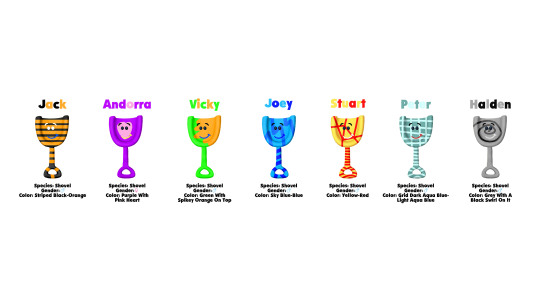
Alright, Here are my 47 new OCs! But this time, It will be clocks, pails, and even shovels! Now let's start with the clocks.
Samuel is a Basketball Colored clock who likes to play Basketball.
Rosie is a striped Sky Blue and Light Blue clock who make plants at the garden.
Bob is an angled Red and Green clock who works on VeggieTales.
Darren is a DNA Production Background colored clock who can do funny things.
Michael and Kristian are Light Mint Green (Michael) and Light Sand Yellow (Kristian) clocks because they're Tickety's Silly Cousins, which is way better than Lilly and Billy. They love to do funny pranks, make jokes and people laugh out loud.
Andrew is a striped green clock who likes to be an actor.
Arthur is a UK flag but with yellow, red, blue and gray colored clock who likes to do the same as Arthur Read does.
Cary is a Cube Red-Dark Tan Yellow clock who likes to develop something using AI.
Griffin is a vertically striped Blue and Light Blue clock who likes to do gaming stuff.
Ian and Anthony are Striped Striped Yellow-Turquoise (Ian) and Turquoise-Yellow (Anthony) clock who runs Smosh together.
Balton is a sided zigzag Light Blue-Bubblegum Pink clock who test out crazy things everyone never tried before.
Johnny is a rocket-shaped Red-Yellow clock who plays with toys.
Carl is a darker tan yellow-dark green clock who loves crossiant (as a dessert).
Jackson is a Red-Yellow clock who likes to be friends with Vissy.
Roxanne is a sunburst Purple-White clock who strips hard.
Allison is a flower shaped Magenta-Red clock who loves to hatch eggs.
Ella is a grid Red-Rose clock who makes something out of wood.
Jenny is a Sky Blue-Light Blue clock who can fly high through the sky.
Sherry is a sunburst Magenta-Brown clock who flirts with handsome male clocks.
Usher is a wavy brown clock who likes to feed pets.
Xavier is an X Blue-Cyan clock who acts like a villian.
Bella is a Light Orange-Orange clock who likes to be Talking Bella
Kya is a star Yellow clock who likes to do the same as Lapis' clocksona does. Plus, Kya was Lapis' prototype clocksona.
And now let's go for pails.
Jared is a grid dark green pail who develops YouTube in 2005.
Dane is a white with black square pail who kills bootleg plushies.
Walden is a zigzag dark aqua blue-orange pail who reads people's minds.
Quincy is a yellow-green-blue pail who likes to do the same as Quincy from Little Einsteins does.
Dave is a vertically striped turquoise-navy blue pail who likes to rap hard.
Penny is a circle illusion green-purple pail who loves to draw.
Laura is an orange-violet pail who likes to do the same as Laura The Carrot does.
Israel is a striped white-blue pail who's always Jewish and lives in Israel.
Zachary is a navy blue with colorful shapes pail who loves to watch Blue's Clues and its spinoffs.
William is a vetically shapes Red-White pail who works at the theater.
Joseph is a green with a basketball pail who likes to do the same as Joseph from SML does.
Cody is a Cody's Clothes that doesn't look like it colored pail who likes to do the same as Cody from SML does.
Randy is a zigzag turquoise pail who likes to be friends with Pail and Tickety and be best friends with Ronny who has the same color as him.
Norman is a light navy blue with infinity shaped orange pail who does naughty stuff like Lilly and Billy did.
Tony is a black with a green star pail who likes to be best friends with TAT Clock.
And finally, We go for shovels.
Jack is a striped black-orange shovel who likes to eat burgers.
Andorra is a purple with pink heart shovel who turns anyone into anything.
Vicky is a green with spikey orange on top shovel who does the same as Vicky from The Fairly Odd Parents does.
Joey is a Sky Blue-Blue shovel who does nothing but being a GoAnimate/Vyond User.
Stuart is a yellow-red shovel who invents something dangerously expiremental.
Peter is a grid dark aqua blue shovel who makes early CGI animation.
Halden is a grey with black swirl on top shovel who likes to play retro games.
What do you think of these new OCs? Which one is your favorite?
#bluesclues#pail#shovel#tickety#ticketytock#shovelbluesclues#pailbluesclues#ticketytockbluesclues#bluescluespail#bluescluesshovel#bluescluesticketytock#bluescluestickety#ticketybluesclues
1 note
·
View note
Text

Die Perlen Lady
Susanne war eine Frau die ein ganz besonderes Flair mit sich trug. Still, leicht melancholisch, das lange dunkle Haar hochgesteckt unter einem breitkrempigen Hut verborgen. Der Hut meist weiß, mit einer schwarzen leichten Umrandung versehen. Auch dieser schlicht, aber wie sie ihn trug… das war schon eine Klasse für sich. Leicht schräg. Nur ansatzweise ließ er im Nacken ein paar vorwitzige schwarze Löckchen die sich gelöst hatten frei. Ihr Gesicht hell, fast alabasterfarben, die graublauen Augen mit schwarzem Kajal umzogen. Manchmal trug sie lediglich Lipgloss um den Lippen Glanz zu verleihen, und manchmal hatten ihre Lippen dieses sinnliche Kirschrot.
Sie trug zu meist ein schwarzes Kleid, ganz schlicht. Die Schultern frei, nur gekrönt von einer langen weißen Perlenkette, zweimal um den Hals geschlungen, dann nach hinten über die nackte Haut fallen gelassen. Hauchfeine Strümpfe und schwarze High Heels. Schwarze Handschuhe bis über den Ellenbogen getragen die sie dann, wenn sie sich an die Bar setzte, langsam auszog und zwar Finger für Finger, sehr wohl wissend das jeder Blick auf ihr lag. Susanne genoss es, dieses Herausschlüpfen aus ihrer sonstigen Normalität. Ein Mal die Woche war sie, ja sie, die Perlen-Lady, die Frau, die die Blicke auf sich zog, alle, ausnahmslos. Sie nickte dem Barkeeper nur zu und er, er stellte das was sie immer trank vor sie hin, wichtig war der rote Strohhalm.
Während sie diesen mit ihren Lippen umschloss, die Augen dabei schloss konnte sie sicher sein, das die Männer in der Bar, sich nur eines vorstellten… Entließ sie den Strohhalm von ihren Lippen und öffnete ihre Augen wieder konnte man von allen Seiten ein verhaltenes Stöhnen hören. Wer oder wen würde sie, die Perlen Lady sich heute auserwählen mit ihr zu gehen? Wer schon mal auserwählt war, lächelte nur still, grüßte die Lady mit einen Nicken, hob sein Glas wie um ihr zuzuprosten und nahm einen Schluck.
Weder Carl, noch Sören, Steffen, oder gar Raphael würden mit dem, was sie mit der Perlen Lady erlebt haben, hausieren gehen. Dazu war das, was sie erlebt haben, etwas unbeschreibliches gewesen. Allein schon, wie sie den Mann, den sie mitnahm auserwählte und wie man sich in diesem Moment vorkam. Das war schon eine Klasse für sich. Die anderen Frauen in der Bar waren in dem Moment wo sie Susanne die Perlen Lady auftauchte unsichtbar. Ab jetzt war das Geschehen in der Bar nur noch Zeitlupe. So, als wenn die Zeit stehen geblieben war.
Wieder schlossen sich ihre Lippen um den Strohhalm und wieder lagen ihr buchstäblich die Männer zu Füßen. Den Männern die neben ihr an der Bar standen, oder saßen, die sahen wie der Saft in den Strohhalm stieg und von ihr vereinnahmt wurde. Die Hosen wurden eng, die Verlegenheiten größer. Der Strohhalm verließ ihre Lippen, sie stellte das Glas auf dem Tresen ab. Das war wie ein Zeichen, Musik setzte ein und Susanne stieg von dem Barhocker ab. Schlucken bei so manchem Mann. Wenn sie jetzt den einen Handschuh rechts wieder überstreifte war die Zeit des Beutezugs gekommen. Oh ja sie tat es, tat es mit der gleichen Langsamkeit wie sie ihn zuvor ausgezogen hatte. Alle Blicke waren auf sie gerichtet. Gleich, gleich würde sie die Perlen von ihrem Rücken nach vorn holen, mit dem jetzt wieder schwarzem Zeigefinger und dann, dann würde sie sie leicht kreisen lassen, nicht nur die Perlen, nein auch ihre Blicke.
Sie würde – man spürte förmlich wie die Luft angezogen wurde – durch die Gasse der Männer gehen die sich sofort bildete, und sich jemanden zum Tanz holen. Ihn erwählen. Dieser war lediglich der Tanzpartner, nicht mehr und nicht weniger. Der Mann den sie nach dem Tanz erkor, das war jener, dem sie, ihre Perlenkette um den Hals legte, nachdem sie diese durch ihre Lippen gezogen hatte. Dieser Mann hatte später das Glück bei ihr zu Hause die Perlen durch ihre anderen Lippen gleiten zu lassen, zu erleben wie sie diese damit verbundene Sinnlichkeit in allen Sequenzen auslebte. Wer, wer war heute der Auserkorene, der Glückliche?
Sie blieb stehen, hielt vor Pierre an, tippte ihn an und der Gang öffnete sich und wurde zu einem Kreis als Pierre ihr folgte. Zwar nur zum Tanz, aber eines Tages, eines Tages durfte er dann mal mit zu ihr, Sören war es auch so ergangen. Diese Aussicht beflügelte ihn gerade zu. Ihr Blick leicht verschleiert, ihre Lippen leicht geöffnet…
Er beugte sich vor, nahm mit seinen Lippen die jetzt lang nach vorn hinunter hängende Perlenkette zwischen seine Lippen und transportierte diese zwischen die ihren. Sie schlossen sich sofort um diese und bewegten sie hin und her.
„Ohhhh…“, war allenthalben zu hören. Jetzt ließ sie diese wieder fallen, schob sie wieder nach hinten in den Nacken, so dass sie wieder über ihren Rücken fielen. Der Tanz begann.
Tango.
Oh, man musste ihn schon beherrschen, so perfekt wie Susanne, die Perlen Lady. Es war ihr Auftritt, ihre Musik, ihr Tanz.
Sie sah es in ihren Augen, wer bereit war für diesen Tanz, den leidenschaftlichsten unter den Tänzen, wer ihn konnte und perfektionierte.
Wer gut und sicher führte und parierte.
Pierre konnte es, hatte er doch extra einen Tanzkurs besucht, allein um die Chance zu haben mit Susanne einmal zu tanzen, mit ihr zu verschmelzen und jetzt, jetzt war es so weit. Nun ja fast…
Die Musik verklang, die letzten Schritte, eine letzte Drehung und er verbeugte sich tief vor ihr und bedankte sich. Trat zurück um Platz für den Auserwählten zu machen. Sie schritt an die Bar zurück. Griff na„Was bekommst du?“, fragte sie den Barkeeper als sie das Glas abstellte und dieser antwortete wie immer: „Nichts, er wurde schon bezahlt.“ Der Griff nach dem zweiten Handschuh, den sie jetzt auch wieder anzog. Sich
umdrehte und lapidar meinte: „Roland du darfst mich heute begleiten.“
Er stand wie erstarrt, konnte sich nicht bewegen, niemals hatte er damit gerechnet dass er…
Neugierig geworden?
----------------------------
Anja Holm
psst... Erotikgeschichten
es könnte heiß werden
ISBN: 9783745097306
Format: Taschenbuch
Seiten: 324
13,00 €
--------------------------------------
-
ansonsten aber über jede Buchhandlung innerhalb von 2 Tagen mit ISBN Angabe bestellbar.
----------------------
https://www.amazon.de/psst-Erotikgeschichten-k%C3%B6nnte-hei%C3%9F-werden/dp/3745097300/ref=sr_1_1?__mk_de_DE=%C3%85M%C3%85%C5%BD%C3%95%C3%91&keywords=Anja+Holm&qid=1578424286&sr=8-1ch ihrem Glas, erneut schlossen sich ihre Lippen um den Strohhalm, wie gebannt schauten die Männer ihr zu. Hochspannung lag in der Luft. Denn wenn sie sich jetzt wieder umdrehte, dann…
0 notes
Text

Carl-Johan Vallgren - Schattenjunge
- Die Jahre waren für Jan unglaublich langsam vergangen, schrieb der Reporter, dafür die Tage viel zu schnell. Und sie entfernten ihn immer weiter von Kristoffer. Langsam verblasste er, auch wenn Jan alles tat, um die Erinnerung an ihn zu bewahren. Er konnte sich nicht mehr an seine Stimme erinnern, und das machte ihn wütend auf sich selbst.
- Er kam am Oxtorget und an der Brücke über die Kungsgaten vorbei. Hastete durch ein Gewirr aus Erinnerungen, die zu seinem alten Leben gehörten; wie er hier oben Stoff versteckt hatte, die Wartungsluken der Straßenlaternen aufgeschraubt und Briefmarkentütchen mit Pulver zwischen den Kabeln versteckt hatte, eine Prügelei, in die er einmal vor dem Restaurant Nalen geraten war, wie er unter der Brücke über der Kungsgatan wegen Drogenbesitzes geschnappt worden und wie er in die Notaufnahme ins Karolinska gefahren worden war, als jemand meinte, er habe sich in der Toilette von US Video eine Überdosis gesetzt.
0 notes